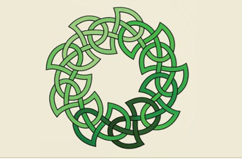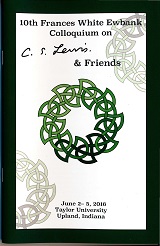Event Title
Paper Session 7-C: Fathers, Friends, and Other Foes
Location
Euler 118
Start Date
4-6-2016 3:30 PM
Description
"Friendship and Hierarchy in Tolkien and Lewis" - Grace Tiffany
This paper will discuss how both C. S. Lewis and J. R. R. Tolkien, chiefly in their fiction represent the paradoxical friendship between beings of unequal status. For many paired characters (Sam and Frodo, Meriadoc and King Theoden in Lord of the Rings, Jane and Mark Studdock in That Hideous Strength), the authors invoke a hierarchical servant-and-master or subject-and-lord model of virtuous, caring relationship, wherein the bond between unequals is defined and strengthened by reciprocal obligations. However, this status-difference model is rendered questionable, not only in that the servants or subjects are often their lords' or masters' moral superiors, but because they are their masters' intellectual equals. Invoking several definitions of friendship, including Aristotle's, St. Paul's, and Lewis's and Tolkien's own, my paper will argue that the naturalistic representation of human friendship undermines the romantic-heroic validation of status differences in the fiction of both Tolkien and Lewis.
Patriarchy and P'daitaBird: The Artistic Influence of Albert Lewis" - Crystal Hurd
Albert Lewis has long been characterized as a failed parent. He was a staple of Irish politics at the turn of the century, serving as a court solicitor in Belfast. Yet his two sons noted that he was often absent and when present, nearly intolerable. However, a closer examination offered in the unpublished Lewis Papers presents a drastically different portrait of Albert Lewis. Here, we find a boisterous, lively patriarch who won over his audiences in both the courtroom and the drawing room. Most notably, Albert had an enduring literary influence on his two sons: Warren, who would become an authority on 17th century French history, and C. S. "Jack" Lewis, the celebrated literary critic, novelist, children's author, and imaginative apologist. For the first time, Albert's poetry, short stories, and political speeches will be explored, uncovering the origin of his son's indomitable devotion to the written word.
"'When Little Lewis Came to Stay': Verse Epistle Death-Match" - Joe Ricke
David and Goliath. Hector and Achilles. Beowulf and the Dragon. Move over petty little spats of old. The greatest "agon" of all, the greatest literary battle of all-time, is about to unfold. The main event: two literary giants, the "Niggler" and the "Bandersnatch," took up their pens to decide, once and for all, who could write the greatest thank you note in all recorded (and previously unrecorded) history.
Event Type
Paper
Paper Session 7-C: Fathers, Friends, and Other Foes
Euler 118
"Friendship and Hierarchy in Tolkien and Lewis" - Grace Tiffany
This paper will discuss how both C. S. Lewis and J. R. R. Tolkien, chiefly in their fiction represent the paradoxical friendship between beings of unequal status. For many paired characters (Sam and Frodo, Meriadoc and King Theoden in Lord of the Rings, Jane and Mark Studdock in That Hideous Strength), the authors invoke a hierarchical servant-and-master or subject-and-lord model of virtuous, caring relationship, wherein the bond between unequals is defined and strengthened by reciprocal obligations. However, this status-difference model is rendered questionable, not only in that the servants or subjects are often their lords' or masters' moral superiors, but because they are their masters' intellectual equals. Invoking several definitions of friendship, including Aristotle's, St. Paul's, and Lewis's and Tolkien's own, my paper will argue that the naturalistic representation of human friendship undermines the romantic-heroic validation of status differences in the fiction of both Tolkien and Lewis.
Patriarchy and P'daitaBird: The Artistic Influence of Albert Lewis" - Crystal Hurd
Albert Lewis has long been characterized as a failed parent. He was a staple of Irish politics at the turn of the century, serving as a court solicitor in Belfast. Yet his two sons noted that he was often absent and when present, nearly intolerable. However, a closer examination offered in the unpublished Lewis Papers presents a drastically different portrait of Albert Lewis. Here, we find a boisterous, lively patriarch who won over his audiences in both the courtroom and the drawing room. Most notably, Albert had an enduring literary influence on his two sons: Warren, who would become an authority on 17th century French history, and C. S. "Jack" Lewis, the celebrated literary critic, novelist, children's author, and imaginative apologist. For the first time, Albert's poetry, short stories, and political speeches will be explored, uncovering the origin of his son's indomitable devotion to the written word.
"'When Little Lewis Came to Stay': Verse Epistle Death-Match" - Joe Ricke
David and Goliath. Hector and Achilles. Beowulf and the Dragon. Move over petty little spats of old. The greatest "agon" of all, the greatest literary battle of all-time, is about to unfold. The main event: two literary giants, the "Niggler" and the "Bandersnatch," took up their pens to decide, once and for all, who could write the greatest thank you note in all recorded (and previously unrecorded) history.


